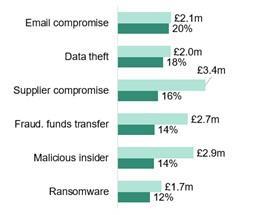Cyber threats remain a top concern as businesses struggle to manage the social media landscape
Social media is one of the biggest risk concerns for organisation, with 63 per cent of global leaders saying it is a top priority when it comes to developing business defence strategies.
It is easy to understand why 27 per cent of significant cyber incidents suffered by global businesses in the last 12 months featured social media as a relevant factor, according to a Global Fraud and Risk Report released by Kroll, a division of Duff & Phelps.
The most common risk, suffered by 39 per cent of businesses, is leaks of internal information. Clearly, businesses are deeply concerned about threats to intellectual property and the loss of trade secrets – a risk that is exacerbated by social media.
As well as internal leaks, organisations should also be concerned about breaches as a result of supplier or client relationships. Data theft and reputational damage caused by third-party relationships affected 29 per cent of respondents this year.
And there are new and emerging concerns too, when it comes to going social. 84 per cent of businesses said they feel threatened by market manipulation through the spread of fake news, most commonly fuelled by social media.
Meanwhile, the trend towards using brand ambassadors and influencers to promote products or services presents a new challenge for due diligence procedures. 78 per cent of survey respondents said they use these tactics some extent, meaning businesses are having to vet not only the influencers themselves, but their wider digital networks
The report showed that firms now face an even wider risk landscape, as they explore how to tackle emerging digital threats and deal with complex reputational and regulatory issues.
For instance, cryptocurrency technology is causing serious headaches for lots of global organisations. Nearly all (91 per cent) of the global business leaders surveyed are investigating or have already adopted distributed ledger technology, whilst 81 per cent are considering or already using cryptocurrencies.
More than a third (35per cent) of businesses cited risk of fraud or theft as the primary concern, followed by lack of clear regulatory oversight (29 per cent), untested technology (19 per cent) and potential involvement with bad actors (16 per cent).
On the flip side, businesses said that new technologies were also one of the main tools in the armoury for dealing with digital threats. More than three-quarters (77 per cent) of firms said they use data analytics to detect threats facing their organisation.
Tom Everett-Heath, Managing Director and Global Head of Business Intelligence and Investigations at Kroll, commented: “Businesses are now operating in more complex and volatile markets than ever, relying on a broader network of third parties and becoming increasingly digitised. In many cases, they’re also putting their reputations in the hands of social media influencers. It comes as no surprise that businesses are looking for better, more efficient ways to prevent and detect these increasingly varied threats, before they escalate into significant issues.”




















No comments yet